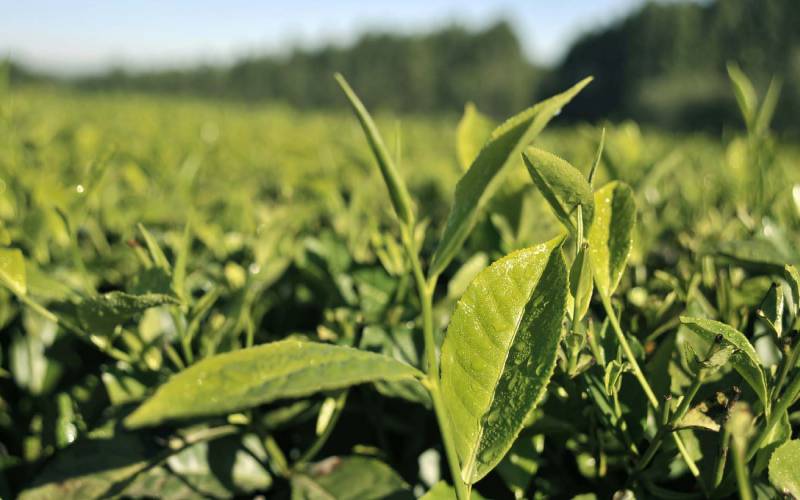
Tea traders have petitioned the government to fast-track the enactment of a National Tea Policy. East African Tea Trade Association (EATTA), Managing Director Edward Mudibo, says whereas the push for a Kenya National Tea Policy started in 2013 and by May 2014 a draft was in place, it wasn’t taken through the Cabinet approval process.
“The absence of the National Tea Policy in Kenya has caused a lack of a coherent approach to development and investment in the tea sector and contributed to unwarranted political interference,” Mudibo said.
Mudibo says the tea sector continues to operate under conflicting legislation and regulations with an uncoordinated approach to tea issues by various members of the national, county assemblies and private sector players. He made the remarks during a tea multi-stakeholder forum by Solidaridad which works toward sustainable inclusive value chains and trade.
Mudibo added that in October 2018, EATTA deployed a consultant and re-engaged the Ministry of Agriculture to restart and complete the National Tea Policy process.
“The key issues are namely low productivity, insufficient development and transfer of technology, high cost of inputs, multiple taxation regimes and poor governance,” he said.
Mudibo said the Draft National Tea Policy (2018), proposes policy directions to address the issues, including reviewing the relationship between management agencies, growers, and the factory boards to enhance accountability and performance.
“The intended outcome of this process will be a comprehensive policy framework for the tea sector in Kenya,” he said.
Mudibo said the new policy framework will address the issues by providing the basis to amend various Acts and regulations.
“EATTA shall continue to engage with the Kenya Government to fast track the enactment of a National Tea Policy,” he said.
Even then, Mudibo argued that the government’s participation in the tea business should be substantially reduced and left to the private sector. Anne Njuguna, the East and Central Africa’s Solidaridad Reclaim Sustainability project officer said the other gap they had noted in the tea sector and across the agriculture sector is gender inclusivity whereby women and youth are only involved in lower cadre jobs.
“Our interest, therefore, is to ensure that the workers’ and citizenry voices, interests, and rights are represented and even considered during decision making to have an inclusive sector,” she said.
Rosemary Lang’at Rop of Ernestea, a cottage factory in Kaptebeswet on the outskirts of Kericho town said as the country waits for a national tea policy, their eyes were on the specialty tea consumers.
“We produce pure oolong (yellow), red, black, purple, and green teas. We are introducing products that aim to expand the tea market and bring in new tea consumers,” she said.
Rop says Kenya is an agricultural country that requires value addition to be taken seriously and for the government to assist cottage industries to penetrate global markets.
“This means that we require investment in effective clearing and forwarding services, and storage and distribution arrangements in different continents,” she says.
Rop also calls on the government to supply subsidised fertiliser to small-holder tea farmers.
“On average, a tea bush under optimum Good Agricultural Practices (GAP) which include the application of fertiliser can produce up to 3.5 kilograms of green leaf per year,” she said.
To address fertiliser shortages and the high cost of the farm input, Kenya Tea Development Agency (KTDA) chairman David Ichoho said the agency plans to construct a Sh3 billion fertiliser factory.
“The agency supported by partners will raise Sh2 billion. We appeal to the government to factor in Sh1 billion in the supplementary budget for the project,” he says.
Sammy Kirui, the James Finlay General Manager - Corporate Affairs, says climate change is threatening the future of the tea industry.
“Rising temperatures, drought, erratic rainfall, and flash floods are taking a toll on the key tea-growing regions, hurting the quality of tea and livelihoods of small-scale farmers in the country,” he said.
For many years Kenya had the optimal climate for tea growing; tropical, red volcanic soils, sunny days and stable rainfall.
A study by the International Center for Tropical Agriculture (CIAT) of climate change impacts on tea production in Kenya up to 2050, estimated that with increasing temperatures and rainfall, optimal areas for tea production will decrease, and production will have to shift to higher altitude areas.
There is a need to adopt sustainable farming practices to help farmers and small and mid-size enterprises in the agricultural sector to adapt to the change in weather patterns. Sustainable farming practices that farmers can adopt include the selection of the most suitable areas for tea growing, crop diversification in low production areas, efficient management of soil and water resources, catchment protection, soil water conservation and rainwater harvesting.
Want to get latest farming tips and videos?
Join Us
 The Standard Group Plc is a multi-media organization
with investments in media platforms spanning newspaper print operations,
television, radio broadcasting, digital and online services. The Standard Group
is recognized as a leading multi-media house in Kenya with a key influence in
matters of national and international interest.
The Standard Group Plc is a multi-media organization
with investments in media platforms spanning newspaper print operations,
television, radio broadcasting, digital and online services. The Standard Group
is recognized as a leading multi-media house in Kenya with a key influence in
matters of national and international interest.
 The Standard Group Plc is a multi-media organization
with investments in media platforms spanning newspaper print operations,
television, radio broadcasting, digital and online services. The Standard Group
is recognized as a leading multi-media house in Kenya with a key influence in
matters of national and international interest.
The Standard Group Plc is a multi-media organization
with investments in media platforms spanning newspaper print operations,
television, radio broadcasting, digital and online services. The Standard Group
is recognized as a leading multi-media house in Kenya with a key influence in
matters of national and international interest.



